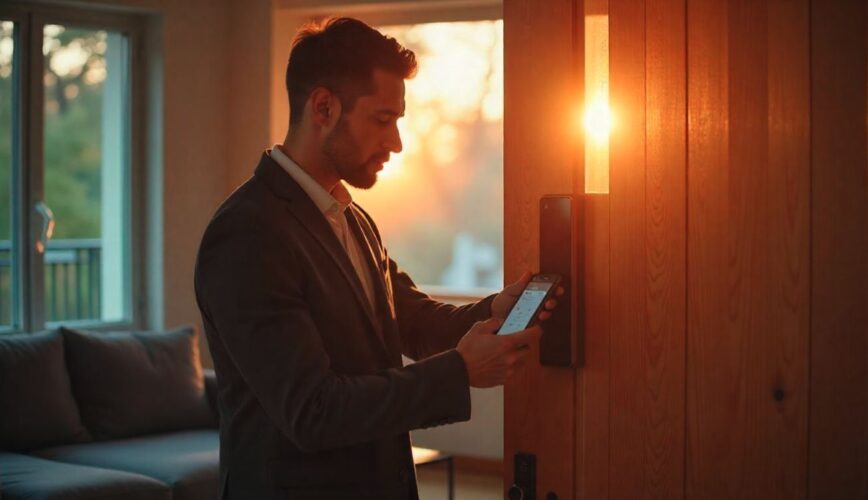In the modern era of technological innovation, smart devices have entered nearly every aspect of our daily lives, including home security. Smart locks are one of the most significant advancements in this domain, offering homeowners a blend of convenience and cutting-edge technology. For the tech-savvy crowd, smart locks are more than just a security upgrade — they’re a glimpse into the future of how we protect our homes and businesses. As the locksmith industry evolves to keep up with this new tech, homeowners are gaining access to features that go far beyond the traditional lock-and-key system.
The Rise of Smart Locks in Home Security
Traditional locks have served their purpose for centuries, but smart locks are changing the game. These devices allow homeowners to control and monitor their door locks remotely, often via smartphone apps or integrated smart home systems. Whether it’s locking your door from across the world or granting access to a guest with a single tap, smart locks offer convenience that traditional locks simply cannot match.
Smart locks work through various methods such as Bluetooth, Wi-Fi, and even biometric verification like fingerprints. With this technology, locksmiths are stepping into a whole new world of high-tech home security. No longer are they only focused on mechanical locks — today’s locksmiths must be well-versed in electronic systems and cybersecurity to help customers safeguard their homes.
Key Features of Smart Locks
Smart locks come equipped with a variety of advanced features that cater to both security and user experience. One of the most popular features is remote access, allowing homeowners to lock or unlock their doors from anywhere. This is ideal for situations where you may forget to lock up or need to grant access to someone while you’re away.
Biometric verification, such as fingerprint recognition, is another futuristic aspect of smart locks. This type of system adds an extra layer of security by ensuring that only authorized individuals can unlock the door. For families with kids or shared living spaces, smart locks offer activity logs that track when the door was locked or unlocked and by whom. This gives homeowners complete oversight of who enters and exits their homes, ensuring peace of mind.
Of course, all these advanced systems require professional installation and maintenance, which brings locksmiths into the picture. With technology evolving so rapidly, locksmiths are learning how to install and service these systems to ensure they work as efficiently and securely as possible.
The Role of Locksmiths in the Smart Lock Revolution
As smart locks become more prevalent, the role of locksmiths is expanding. In the past, a locksmith’s primary job was to cut keys or replace locks. Today, locksmiths are embracing technology, learning how to integrate these sophisticated systems into the homes of their customers.
Installing a smart lock involves more than just swapping out hardware — it often requires integrating the lock with a home’s Wi-Fi or Bluetooth network. Locksmiths are becoming experts in these setups, ensuring that each device functions as it should and is secure from potential cyber threats. With smart locks relying heavily on digital interfaces, locksmiths are also offering services that go beyond physical security, ensuring that cybersecurity features are properly enabled.
Additionally, locksmiths are playing a key role in educating customers about how to properly use and maintain their smart locks. From setting up emergency access codes to understanding how to use voice assistants to lock and unlock doors, locksmiths help homeowners navigate the complexities of smart technology.
The Future of Smart Locks
The future of smart locks looks promising, with new advancements on the horizon that will make home security even more efficient and secure. Developers are working on integrating even more seamless technologies, such as facial recognition and advanced AI, to further improve security. This continuous innovation will keep locksmiths at the forefront of security services, adapting their skills to meet new technological demands.
Moreover, as more people invest in smart home systems, the integration of smart locks with other devices, such as security cameras and alarm systems, will likely become the norm. Locksmiths will be essential in ensuring that these integrated systems function properly and remain secure against hacking or malfunction.
Conclusion
Smart locks are transforming home security, offering a new level of convenience, control, and safety. As technology continues to advance, the role of locksmiths is evolving alongside it. Locksmiths are now at the intersection of physical and digital security, ensuring that smart locks are properly installed and secure from both physical break-ins and cybersecurity threats. For tech enthusiasts and homeowners alike, smart locks represent the future of home security — and locksmiths are key to unlocking that future.










